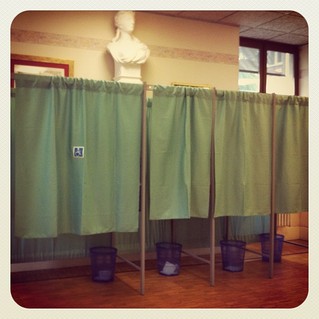
“In the end, the odds still favor the popular and electoral vote heading in the same direction, but the chances of a split like the one in 2000 are very real, along with the distinct possibility of ambiguity and vote-counting issues once again putting the outcome in question. Ugh,” he writes.
Ugh, indeed.
If this topsy-turvy result happened, it would be the fourth time in history. The most recent, as Cook
| | alludes, gave George W. Bush the White House in 2000 because he won the Electoral College, even though Al Gore got the most votes overall. But I echo the “Ugh” to this outcome only because it would give the politically naïve more ammunition to change a system that works. The truth is, there is no such thing as a perfect election system — one that guarantees the will of the people and protects the politically weak from being steamrolled by the politically powerful. Stop laboring under that delusion and ask yourself this question: What is the goal of a presidential election? Is it to empower the person who collects the most votes? In that case, a popular election won’t necessarily guarantee the will of the people any more than the Electoral College. Bill Clinton never got 50 percent of the popular vote. Third and fourth party candidates are likely to proliferate under a system that only counts votes. The nation then would have to decide whether the election should be handed to whichever candidate receives the most votes, or whether the winner must have at least 50 percent plus one. If it’s the latter, you will end up with runoff elections and a coalition government. For instance, in 2000, Ralph Nader would have been eliminated in a runoff, but he then could have demanded that Al gore accept some of his platform in exchange for his endorsement. The same might have happened on the other side in the ‘90s with Ross Perot. If you simply allow the person with the most votes to win, you end up with a leader who was elected by a minority of the people. Does Europe have a better system? There, voters elect parties, and the winning party then sets up a government, often having to form coalitions with other parties when no clear winner emerges. It’s merely a different form of unfairness, depending again on what you think ought to be the goal. The Electoral College puts the focus squarely on the states. Each state holds its own popular vote for president, and candidates are forced to focus on issues that are important to those states. This is the best way to look after the unique needs of a far-flung and diverse nation. Under no other system would Colorado attract the attention it has during this race. The same can be said for Nevada. It’s also not a perfect system. In recent decades, Americans seem to have segregated themselves by geography. When it comes to presidential politics, the number of battleground states are precious and few, at least during an election as close as this one. Realclearpolitics.com lists 10 states as tossups, totaling 131 electoral votes. Those states solidly in one camp or another have told the candidates how the majority of their people feel about the race. However imperfect that may be, it is correct to put state needs front and center in presidential politics. That is far better than putting the emphasis on large urban centers, which is what would result from a purely popular vote system. |

 RSS Feed
RSS Feed

